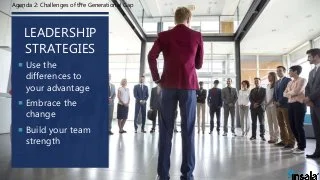
How to Develop Strategies that Close the Leadership Gap with the Generation Gap
The proverbial alarm has been sounding and going off for several years. There has been too little attention and focus on addressing the impending catastrophe.
The leadership gap that has been forecasted for the past several years is upon us. And, it could not have come at a worse time with the Covid-19 pandemic still underway, impacting each of the multiple generations in the workforce differently.
Many companies are unable to keep pace with their need to fill leadership openings created by Baby Boomers taking retirement and by companies expanding, in some cases at rapid rates. Their pipelines are not sufficient to fill the increasing number of leadership openings promptly.
Companies that lack a focused strategy and drive to close this gap might very well find themselves struggling to stay in business and maintain their market share.
Related: 4 Ways Businesses Can Bridge the New Generation Gap
The significant numbers of Baby Boomers taking retirement for the past ten years have only exacerbated the leadership gap. Many of them are leaving their leadership roles for their well-earned leisure lifestyle.
In the third quarter of 2020, the number of Boomers who retired increased by over three million from the same quarter in 2019. That number will grow in 2021 and over the next several years. The Covid-19 pandemic accelerated the mass retirements. Many Boomers are generally dissatisfied with the ways business is being conducted with colleagues from other generations.
The alarm has been sounded.
It is widely accepted that there is an ongoing conflict between Baby Boomers and Millennials when communicating with each other and not seeing eye to eye on each generation’s work ethic.
The Millennials currently represent the largest generation in the workplace. They will likely be the best source for many companies’ leadership openings. Companies that can develop the best strategies for attracting, developing and retaining millennial leadership candidates will do their best to avoid the leadership gap’s negative consequences.
Time appears to be a limited resource for finding and engaging these potential millennial leaders. Those companies that can act quickly and flexibly will win the race in closing the leadership gap.
This might not be enough for some companies to sound the alarm louder and implore a call to action. There are trends in both leadership and the diversity, equity and inclusion space that might just put them over the edge.
Three of the critical leadership trends include:
A noticeable increase in women stepping into senior executive roles across Fortune 500 companies.
- There is a substantial focus on formalizing the functions of allies, mentors and sponsors in supporting the emerging leaders.
- The attention and investment into diversity, equity and inclusion initiatives are at an all-time high.
A set of trends related to diversity, equity and inclusion intersect with these leadership trends.
- The next level of clarifying critical roles and responsibilities for diversity, equity and inclusion is essential to achieving any strategic goals.
- The role of employee resource groups will become more pronounced and significant as companies’ cultures transform to being more diverse, equitable and inclusive.
- The need for skilled and competent leaders will continue to be at the forefront of many companies’ talent development strategies.
The argument for closing the leadership gap intensifies when the trends are analyzed further.
It seems an excellent place to start on closing the leadership gap is in closing the generational gap.
The start of any good working relationship is in the introductions. When Boomers and Millennials get in the same place simultaneously and start a conversation on how to close the leadership gap collectively, the work needed to close it is underway.
The Boomer leaders can take the lead in introducing the Millennials to some proven tools that will guide them in their collective work of closing the leadership gap.
Some career development best practices include:
- During the meetings, Boomers might ask more and tell less. Using the power of questions and active listening can go a long way in finding a productive middle ground.
- Bringing the succession plan model into the meetings will provide the template for ensuring nothing is missing when discussing the go-forward plan.
- Following the career development plan will enhance the chances of developing a leader’s unique leadership style.
Closing the leadership gap with intention, focus and attention will lead to a more structured leadership development framework. And, it will support developing the needed skills and competencies to be an effective leader.
Additionally, the company culture will be positively impacted when the leadership gap is closed, in part, by internal candidates.
Related: Millennials Can Bridge the Generation Gap With Boomers
Lastly, the emerging leaders will have an opportunity to capitalize on introducing change while transforming their companies. Increased empowerment is just one strategy that promotes engagement, effectiveness and efficiency.
Companies that pursue a strategy focused on closing the leadership gap will reap the benefits of having more competent leaders skilled in developing more diverse, equitable, and inclusive workplaces….[Read more at:https://www.entrepreneur.com/article/368470]

